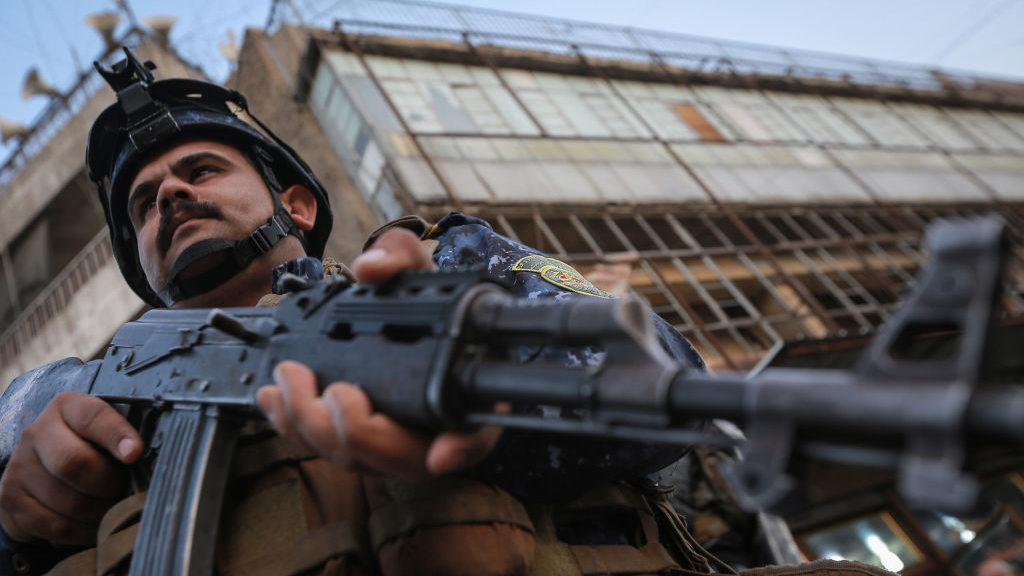Rise in Rocket Attacks in Iraq Attributed to Domestic, Regional Politics
Recent attacks have targeted the areas of the Green Zone in Baghdad that host US troops, diplomats and contractors
Rocket attacks on US interests in Iraq have increased in recent weeks, and the United States says the chief suspect behind these attacks is armed Iraqi militias aligned with Iran.
U.S. President Joe Biden and Iraqi Prime Minister Mustafa Al-Kadhimi discussed the uptick in rocket attacks on Iraqi and coalition forces in a phone call on Tuesday and agreed those responsible “must be held fully to account,” the White House said.
Just last week, three attacks took place, with the latest in the capital Baghdad targeting the Green Zone areas that host U.S. troops, diplomats and contractors.
Ali Bakeer, an Ankara-based political analyst and researcher, told The Media Line there ” is no question that Iran stands behind the latest attacks.”
“All evidence points to the Iraqi Shiite militias aligned with Iran. It is not a secret that those militias are trained, funded and equipped by Iran’s IRGC to do Tehran’s dirty jobs in the country,” said Bakeer, referring to the Islamic Revolutionary Guard Corps., a branch of the Iranian Armed Forces.
The Monday attacks happened just days after a barrage of rockets hit an air base north of the capital where a US military contractor maintains Iraqi F-16 fighter jets purchased from Washington.
Phillip Smyth, an expert on Iranian politics and the 2018-2019 Soref Fellow at the Washington Institute for Near East Policy, told The Media Line that these militias are backed and controlled by Iran, and act at the behest of Iranian military orders.
“These well-known organizations have instigated a lot of violent talk,” he said, accusing the Iranians of taking these groups and helping them form a “front” organization similar to the one that claimed responsibility for the February 15 attack on the Erbil airport.
In that critical escalation, a rocket hit the U.S. military base at Erbil International Airport in the Kurdish-run region killing a civilian and a foreign contractor working with US-led troops.
The Erbil attack carries with it several domestic, regional and international messages according to Smyth.
One message is to the Turks, “who have been getting increasingly more involved in northern Iraq,” he said. Another message is to Kurdish political parties – the nationalist Patriotic Union of Kurdistan, and the government coalition partner the Kurdistan Democratic Party (KDP). The message is meant particularly for the KDP, Smyth said, “because the KDP is not on the same page with the Iranians.”
Now that Biden is president, these organizations need to test his resolve, they want to see how far they can push the Americans
Iran-backed Iraqi militia groups on Tuesday denied any role in recent rocket attacks against U.S. targets in Iraq.
Despite the quick denial and condemnation of the strikes by Iraqi Shia paramilitary groups such as Kataib Hezbollah and Asaib Ahl al-Haq, many still are doubtful.
Analysts suggest that these groups want to test the new US administration. Smyth says the recent attacks carry a message intended for the US, at a time when Washington and Tehran are looking for ways to revive the nuclear deal ditched by former U.S. President Donald Trump in 2018.
“Now that Biden is president, these organizations need to test his resolve, they want to see how far they can push the Americans,” said Smyth.
Bakeer says the resumption of attacks on US interests in Iraq are early signs of an Iraq “emboldened” by the Biden Administration’s policy toward the Islamic Republic.
“One of the main goals of such attacks to increase pressure on the US administration. From the Iranian perspective, such leverage proved to be working well against US administrations unwilling to show toughness and exert pressure against Tehran,” he said.
Analysts say local and international politics played a direct role in the resumption of the attacks.
With parliamentary elections scheduled later this year, these Iraqi armed groups are sending a strong message to Kadhimi in a challenge to his authority.
“The domestic political aim – if you are talking about dealing with government – it’s another way to make Kadhimi look weak and put pressure on his administration. It’s another way to keep in check Iraqi forces that will be more counter to what the Iranians want,” Smyth said.
Tehran has insisted that it will not fulfill all its nuclear commitments until Washington lifts the sanctions.
Whether or not the attacks achieve their goal “will mainly depend on how the Biden Administration in the US will react to them,” said Bakeer.
Tensions between Iran and the US reached a dangerous peak with the threat of a regional war after the US assassination of Iranian general Qasem Soleimani and Kataib Hizbullah top leader Abu Mahdi al-Muhandis in Baghdad in January 2020.


